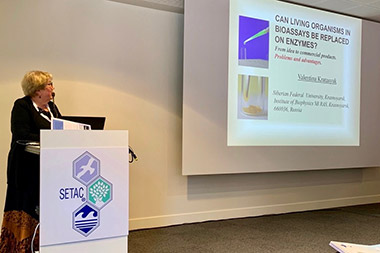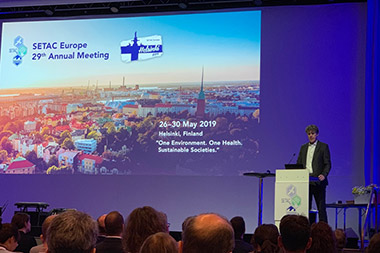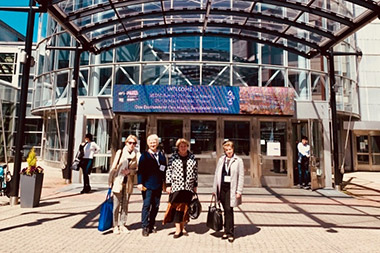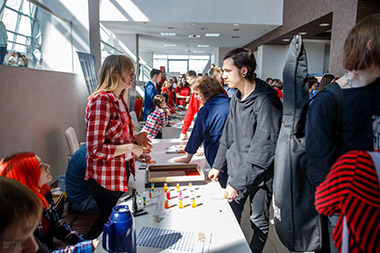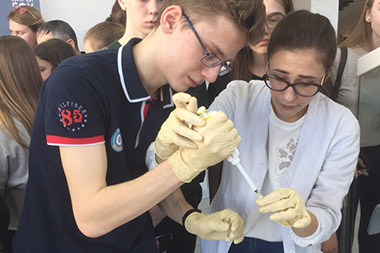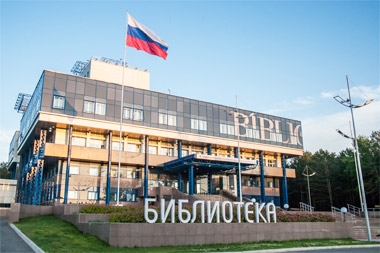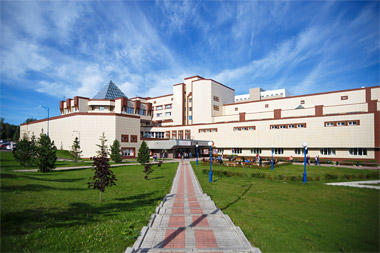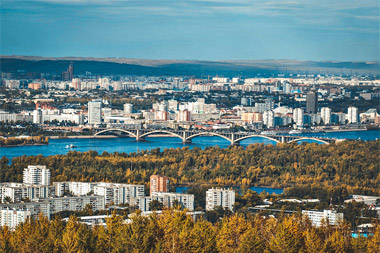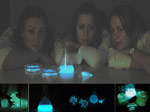 The Program is aimed at students having background in natural science and wishing to master contemporary methodology of scientific research in order to pursue career in the field of biological engineering. The scientific projection in biological engineering aims to encourage research skills by students through an individual research project in biology, biological engineering or biophysics. Students will follow all steps of research process from the problem statement to the achievement and analysis of experimental results.
The Program is aimed at students having background in natural science and wishing to master contemporary methodology of scientific research in order to pursue career in the field of biological engineering. The scientific projection in biological engineering aims to encourage research skills by students through an individual research project in biology, biological engineering or biophysics. Students will follow all steps of research process from the problem statement to the achievement and analysis of experimental results.
Master’s Program “Biological engineering” is delivered by an experienced academic staff having a comprehensive background in fundamental research and practical applications in industries. The program is designed with emphasis on practical skills development and students work in the modern and well-equipped SibFU Laboratory of Bioluminescent Biotechnologies (in Russian). This laboratory was established through the collaboration of the world’s strongest team of scientists engaged in fundamental research of light emission by living organisms, i. e. bioluminescence, and the Nobel Laureate Professor Osamu Shimomura.
Training
Methods: lectures, lab experiments, case studies and group discussions.
Teaching staff: SibFU Professors and visiting lecturers from universities of Russia, USA, Italy, China, Spain, UK and other countries.
The major part of the Program’s training takes place at the modern and well-equipped SibFU Laboratory of Bioluminescent Biotechnologies, led by Nobel Laureate Professor Osamu Shimomura, in one of the world’s strongest team of scientists engaged in fundamental research of light emission by living organisms, i.e. bioluminescence.
Research projects
While following the Program students have to deal with the phenomenon of bioluminescence in all its aspects: from genetic and molecular to evolutionary and ecological. Master’s research projects are focused on studying the chemical nature of light emission by new luminous species (fungi, soil worms, coelenterates, bacteria, etc.), modelling the enzyme behavior in cell hyaloplasm, development of new recombinant bioluminescent organisms and of a new generation of bioluminescent biosensors for environmental monitoring and medical diagnostics as well as on other fundamental and applied topics.
Diploma and degree: Master of Science in Biology.
Career opportunities: with a Master’s degree in Biosciences you can obtain a position in both public and private sector.
Research career: the Master’s degree holder can continue studying to earn a PhD SibFU degree.
Prof. Valentina KRATASYUK
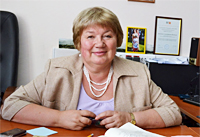 Doctor of Sciences (Biology), Head of Biophysical Department, School of Fundamental Biology and Biotechnology, Siberian Federal University.
Doctor of Sciences (Biology), Head of Biophysical Department, School of Fundamental Biology and Biotechnology, Siberian Federal University.
After graduation from Novosibirsk State University, School of Natural Science in 1975 and Ph.D. studies (Institute of Biophysics SB RAS, 1985.) V.A. Kratasyuk got D.Sc. in Biological sciences (Biophysics) from Institute of Biophysics SB RAS in 1995. Professor, Head of the Department of Biophysics (Siberian Federal University) since 1999.
Author and co-author of more than 250 scientific publications (58 Referred Journal Articles, 3 Book Coauthored, 2 Books Edited, 3 Book Chapters, 13 Patents). Project leader and research associate in more than 20 Russian and International projects.
Member of The Scientific Council of the International Society of Bioluminescence and
Chemiluminescence (since 1993), International Society on Bioencapsulation (since 1994), Russian Biochemical Society (Since 1975), The European Society for Photobiology (Since 2007).
Please visit her web-page on ResearchGate.
Research interests: bioluminescent biosensors, biophysics, biotechnology, biochemistry, luminous bacteria, bioluminescent analysis, enzymatic toxicity bioassays, history of biology, science education.
Education and Academic Degrees
2003 — Professor, Biological Sciences (Biophysics), Siberian Federal University (former Krasnoyarsk State University).
1995 — Doctoral degree (D.Sc.), Biological Sciences (Biophysics), Institute of Biophysics, the Siberian Branch of the Russian Academy of Sciences, Krasnoyarsk, Russia.
1985 — Kandidatskaya degree (PhD), Biological Sciences (Biophysics), Institute of Biophysics, the Siberian Branch of the Russian Academy of Sciences, Krasnoyarsk, Russia.
1975 — Specialist, Biology (Biochemistry), Novosibirsk State University, School of Natural Science, Novosibirsk, Russia.
Membership and Qualifications:
- The member of The Scientific Council of the International Society of Bioluminescence and Chemiluminescence (since 1993),
- International Society on Bioencapsulation (since 1994),
- Russian Biochemical Society (Since 1975),
- The European Society for Photobiology (Since 2007).
Valentina Kratasyuk
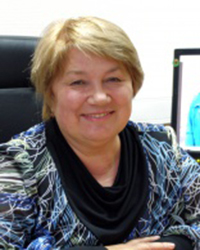
Doctor of Sciences (Biology), Professor
Current Position:
- The Head of the Biophysics Department, Institute of Fundamental Biology and Biotechnology, Siberian Federal University.
- Leading Researcher, Laboratory of Photobiology, Institute of Biophysics, the Siberian Branch of the Russian Academy of Sciences, Krasnoyarsk.
- Honorary Professor of Agricultural and Biological Engineering Department at the University of Florida (USA).
- Research Director, Applied BioSystems, Ltd, Krasnoyarsk.
Research Interests: Mechanisms of bioluminescence, bioluminescent enzymatic biosensors, bioluminescent toxicity bioassays, bioluminescent analysis, biotechnological design, biochemistry, science education, education based on bioluminescence, history of sciences, immobilization of enzymes.
Address: room 13-08, Svobodny pr. 79, Krasnoyarsk
Phone: +7 (391) 206-21-66
E-mail: VKratasyuky@sfu-kras.ru
Google Scholar: scholar.google.com
Personal webpage: structure.sfu-kras.ru, www.ibp.ru, bio.sfu-kras.ru
Profile on another site(s): researchgate.net
Sergey Bartcev
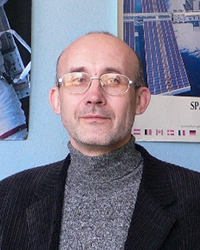
Doctor of Sciences (Biophysics)
Current Position:
- Professor, the Biophysics Department, School of Fundamental Biology and Biotechnology, Siberian Federal University
- Head of Theoretical Biophysics Laboratory, Institute of Biophysics SB RAS, Federal Research Center “Krasnoyarsk Science Center SB RAS”, Krasnoyarsk.
Research Interests: Global ecological crises and biosphere stability, early stages of prebiotic chemical evolution, biological life support systems for long-duration manned space missions, artificial neural networks for studying complex biological systems.
Education and Academic Degrees
- 2004 — Doctoral degree (D.Sc.), Physical and Mathematical Sciences (Biophysics), Institute of Biophysics, the Siberian Branch of the Russian Academy of Sciences, Krasnoyarsk, Russia.
- 1986 — Kandidatskaya degree (PhD), Physical and Mathematical Sciences (Biophysics), Institute of Biophysics, the Siberian Branch of the Russian Academy of Sciences, Krasnoyarsk, Russia.
- 1977 — Specialist, Biophysics, Krasnoyarsk State University, Krasnoyarsk, Russia.
Membership and Qualifications:
- Deputy Organizer of F4.3 Event of COSPAR (Committee on Space Research) (1996 — 1998).
- Main Scientific Organizer of F4.3 Event of COSPAR (1998 – 2006).
- Deputy Organizer of F4.3 Event of COSPAR (2006).
Address: Akademgorodok 50/50, Krasnoyarsk
Phone: + 7 (391) 249-43-28
E-mail: SBartsev@sfu-kras.ru
Google Scholar: scholar.google.com
Personal webpage: www.ibp.ru, bio.sfu-kras.ru (in Russian)
Profile on another site(s): , researchgate.net
Peter Belobrov
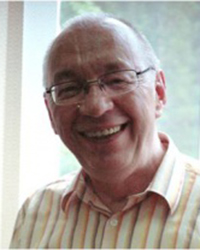
Doctor of Sciences (Biophysics)
Current Position: Professor, the Biophysics Department, School of Fundamental Biology and Biotechnology, Siberian Federal University.
Research Interests: Diamond 2-5 nm, self-organisation, dipolic, biosensors, microfluidics, luciferase, T-spin, ab initio principles of biology.
Education and Academic Degrees
- 1997 — Doctoral degree (D.Sc.), Physical and Mathematical Sciences (Biophysics).
- 1978 — Kandidatskaya degree (PhD), Physical and Mathematical Sciences.
- 1969 — Specialist, Physics, Kharkov State University, Kharkov, Ukraine.
Address: room 7-04, Svobodny pr. 82, Krasnoyarsk
Phone: +7 (391) 206-21-66
E-mail address: pbelobrov@sfu-kras.ru
Personal Webpage: bio.sfu-kras.ru
Google Scholar: scholar.google.com
Profile on another site(s): www.researchgate.net
Irina Sukovataya
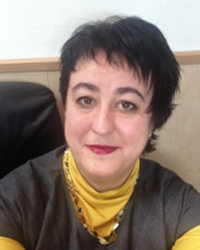
PhD, Biological Sciences (Biophysics)
Current Position
Associate Professor, the Biophysics Department, Deputy Director of the Institute of Fundamental Biology and Biotechnology, Siberian Federal University.
Research Interests
Physical and chemical basis of enzyme catalysis, stability of enzyme systems, non-aqueous enzymology, bioluminescent enzymes, bioluminescent biotests.
Higher education, joint educational programs, e-learning, application of information and communication technology in natural science research and education, creating joint educational programs, exchange of educational products, joint grant applications, master degree programs: biology, biophysics, biochemical physics, physics, biology engineering.
Education and Academic Degrees
- 2000 — Kandidatskaya degree (PhD) in Biophysics, the Institute of Biophysics of SB RAS, Krasnoyarsk, Russia.
- 1994 — Specialist, Biophysics, Krasnoyarsk State University, Krasnoyarsk, Russia.
Address: room 32-13, Svobodny pr. 79, Krasnoyarsk
Phone: +7 (391) 206 2165
E-mail address: isukovataya@sfu-kras.ru
Personal Webpage: bio.sfu-kras.ru
Profile on another site(s): Researchgate.net
Irina Sviderskaya
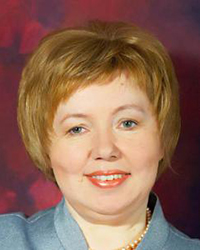
PhD (Biology)
Current Position Assistant Professor, the Biophysics Department, School of Fundamental Biology and Biotechnology, Siberian Federal University.
Research Interests Biophysics, dendroclimatology, ecology, botany, biophysics of complex systems, academic English, structure of scientific texts, education technologies.
Education and Academic Degrees
Biophysicist, graduated from Krasnoyarsk state university, Russia.
1999 — Kandidatskaya degree (PhD) in Botany.
2001-2002 — Fulbright program alumna (senior researcher program in ecology).
Address: room 13-08, Svobodny pr. 79, Krasnoyarsk
Phone: +7 (391) 206-21-65
E-mail address:
Personal Webpage: bio.sfu-kras.ru, structure.sfu-kras.ru
Google Scholar: scholar.google.ru
Profile on another site(s): researchgate.net/
Elena Nemtseva
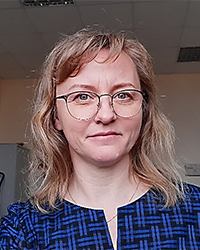
PhD (Biophysics)
Current Position
- Assistant Professor, the Biophysics Department, Institute of Fundamental Biology and Biotechnology, Siberian Federal University.
- Researcher, Laboratory of Bioluminescent Biotechnologies, Siberian Federal University.
- Senior Researcher, Research Department, Siberian Federal University.
Research Interests
- Mechanisms of the bio- and chemi-luminescence: factors, determining the color and quantum yield of bioluminescent emitters
- Fluorescent spectroscopy of biological molecules including time-resolved fluorescence of proteins
- Enzymes functioning under native-like conditions: effects of osmolytes, macromolecular crowding and diffusional restriction
- Probing of proteins conformation changes with optical techniques, tryptophan as an intrinsic protein fluorophore
Education and Academic Degrees
- 2002 — Kandidatskaya degree (PhD), Physical and Mathematical Sciences (Biophysics), Institute of Biophysics SB RAS, Krasnoyarsk, Russia.
- 1998 — Master of Science in Physics, Krasnoyarsk State University, Department of Physics, Krasnoyarsk, Russia.
- 1992-1997 — Krasnoyarsk State University, Department of Physics, Krasnoyarsk, Russia; Specialty: Biophysics.
Address: Svobodny pr. 79, Krasnoyarsk
Phone: +7 (391) 206-20-72
E-mail address: ENemtseva@sfu-kras.ru
Personal Webpage: bio.sfu-kras.ru
Google Scholar: scholar.google.ru
Profile on another site(s): researchgate.net
CV (.pdf)
Elena Esimbekova
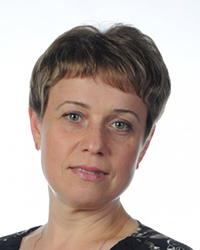
PhD, Biological Sciences (Biophysics)
Current Position
- Assistant Professor, the Biophysics Department, School of Fundamental Biology and Biotechnology, Siberian Federal University.
- Senior Researcher, Institute of Biophysics of RAS, Krasnoyarsk.
Research Interests Bioluminescence, luciferase, immobilization of enzymes, stabilization of proteins, bioluminescent assay, ecological monitoring.
Education and Academic Degrees
- 2000 — Kandidatskaya degree (PhD), Biological Sciences (Biophysics), Institute of Biophysics SB RAS, Krasnoyarsk, Russia.
- PhD thesis «Study the sensitivity of triple enzyme system with bacterial luciferase for biotesting of water ecosystems».
- 1991 — Specialist, Diploma in Biophysics, Krasnoyarsk State University, Krasnoyarsk, Russia.
Address: Akademgorodok 50/50, Krasnoyarsk
Phone: +7 (391) 249-42-42
E-mail address: eesimbekova@sfu-kras.ru, esimbekova@yandex.ru
Personal Webpage: structure.sfu-kras.ru (in Russian), ibp.ru
Google Scholar: scholar.google.ru
Profile on another site(s): researchgate.net
CV (.pdf)
Elena Eremeeva
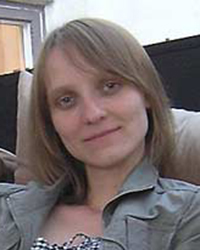
PhD (Biochemistry, Biophysics)
Current Position
- Assistant Professor, the Biophysics Department, School of Fundamental Biology and Biotechnology, Siberian Federal University.
- Senior Researcher, Photobiology Laboratory, Institute of Biophysics SB RAS, Federal Research Center “Krasnoyarsk Science Center SB RAS”, Krasnoyarsk
Research Interests Coelenterazine-dependent bioluminescence, luciferases, photoproteins, bioluminescence mechanisms, bioluminescence imaging.
Education and Academic Degrees
- PhD thesis «Molecular mechanism of active photoprotein complex formation».
- 2013 — PhD, Biochemistry, Wageningen University, Wageningen, The Netherlands.
- 2010 — PhD, Biophysics, Institute of Biophysics SB RAS, Krasnoyarsk, Russia.
- 2005 — Msc, Biochemistry, Krasnoyarsk State University, Krasnoyarsk, Russia.
Address: Akademgorodok 50/50, room 3-11, Krasnoyarsk
Phone: +7 (3912) 494430
E-mail address: everemeeva@sfu-kras.ru, l_eremeeva@mail.ru
Personal Webpage: structure.sfu-kras.ru (in Russian),
ibp.ru
Google Scholar: scholar.google.ru
Profile on another site(s): researchgate.net
Andrey Shuvaev
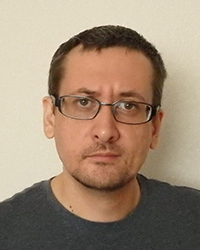
PhD (Biophysics)
Current Position
The Head of the Department of Biomedical Systems and Complecses, Siberian Federal University
Research Interests Biostatistics, Computational Neurology
Education and Academic Degrees
- 2008 — Kandidatskaya degree (PhD., Physical and Mathematical Sciences (Biophysics).
- 2004 — BSc, Biophysics, Siberian Federal University, Krasnoyarsk, Russia.
- 2001 — Specialist, General Medicine, Krasnoyarsk State Medical Academy, Krasnoyarsk, Russia.
Address: room 13-08, Svobodny pr. 79, Krasnoyarsk
Phone: +7 (391) 206-21-66
E-mail address: ashuvaev@sfu-kras.ru
Personal Webpage: structure.sfu-kras.ru (in Russian)
Google Scholar: scholar.google.com
CV (.pdf)
Ranjan Rajeev
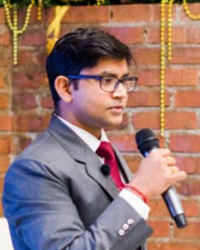
PhD (Biotechnology)
Current Position Assistant Professor, the Biophysics Department, School of Fundamental Biology and Biotechnology, Siberian Federal University.
Research Interests Microbiology, Enzymology, Environmental Biotechnology, Biosensor, Molecular Biology
Education and Academic Degrees
- Ph.D. in Biotechnology (2009-2015) under the supervision of Dr. M.S. Thakur, Chief Scientist (Retd.) and Former Head, Fermentation Technology and Bioengineering Department, CSIR-Central Food Technological Research Institute, Mysore-570 020, India & Visiting Professor, UPE, M. Tech. in Material Science, Vijnana Bhavan, Mysore University, Mysore
- M.Sc. in Marine Biotechnology (2007-2009) from Department of Biotechnology, Goa University, Taleigao Plateau, Goa, India with First Class grade
Personal Webpage: bio.sfu-kras.ru
Google Scholar: scholar.google.com
CV (.pdf)
| Fields of study | Biology, Biophysics, Biochemistry, Biological Engineering, Environmental Sciences |
|---|---|
| Duration | 2 years |
| Starting date | September, 1st |
| Study intensity | Full-time |
| Delivery mode | Blended |
| Type of degree | M. Sc. |
| Credits | 120 ECTS credits |
| Language of instruction | English |
| Academic requirements |
|
| Tuition fee (per year) | 250,000 rubles The cost does not include accommodation and living expenses. The price could change at the time of signing a learning agreement. |
| Application deadline | July 29th |
| Accommodation | On-campus accommodation is available in double and triple-occupancy rooms (€ 20 per month) |
| Practicalities | Airport transfer and invitation letter for a Russian study visa are provided by the University |
Program structure

Study Plan
| 1 semester | 31 ECTS credits |
|---|---|
| Master's courses | 24 ECTS credits |
| Methodology and Philosophy of Sciences | 4 ECTS credits |
| Biosphere and Global Environmental Issues | 3 ECTS credits |
| Computer Technologies in Science and Education | 4 ECTS credits |
| Research Seminar I | 2 ECTS credits |
| English for Proffessional Communication | 5 ECTS credits |
| Contemporary Issues of Biophysics | 4 ECTS credits |
| Research | 9 ECTS credits |
| 2 semester | 31 ECTS credits |
| Module 1 “Bioluminescent Biotechnologies” | 21 ECTS credits |
| Compulsory courses | 15 ECTS credits |
| Physics and Сhemistry of Bioluminescence | 4 ECTS credits |
| Bioluminescent Biotechnologies | 4 ECTS credits |
| Photobiophysics | 4 ECTS credits |
| Research seminar | 3 ECTS credits |
| Elective course | 6 ECTS credits |
| Laboratory Training Course: Mechanisms and Applications of Bioluminescence (.pdf) | 6 ECTS credits |
| State-of-the-Art Equipment and Methods for studying of Biological Systems | 6 ECTS credits |
| Research | 10 ECTS credits |
| Optional course | |
| Molecular Biophysics | 2 ECTS credits |
| Arctic Amplification and Environmental change | 3 ECTS credits |
| 3 semester | 30 ECTS credits |
|---|---|
| Module 2 “New Approaches in Biological Engineering” | 21 ECTS credits |
| Compulsory courses | 15 ECTS credits |
| Optimization and Data Analysis in Biology (.pdf) | 4 ECTS credits |
| Theoretical Biophysics | 5 ECTS credits |
| Biological Еngineering (.pdf) | 6 ECTS credits |
| Elective courses | 6 ECTS credits |
| Writing and Presenting Science (.pdf) | 3 ECTS credits |
| Managment of Aquatic Ecosystems (.pdf) | 3 ECTS credits |
| Fundamentals of Food and Nutrition (.pdf) | 3 ECTS credits |
| Advanced Biostatistics (.pdf) | 3 ECTS credits |
| Research | 9 ECTS credits |
| Optional course | |
| Trace kinetics | 2 ECTS credits |
| 4 semester | 28 ECTS credits |
| Master's Thesis | 22 ECTS credits |
| Defense of the Thesis | 6 ECTS credits |
October 2021
Academic staff and students of the Master’s Program «Biological Engineering» participated in the International Satellite Conference «Ecological Monitoring: Methods and Approaches» (September 22-23, 2021, Krasnoyarsk, Russia). The event was hosted by Siberian Federal University with the support of the Society of Environmental Toxicology and Chemistry (SETAC). The conference was held using blended format, allowing the participants to communicate both live and virtually.
The participants were welcomed by Ruslan Baryshev, the Vice-Rector for Science of Siberian Federal University, and by Prof. Valentina Kratasyuk, the Conference chair, the Head of Biophysics Department, the Leader of the Master’s Program «Biological Engineering». Practical scientists from the Institute of Resources, Environment and Sustainability (Canada), National Oilwell Varco (United Kingdom), German Environment Agency (Germany), University of Cardis (Spain), Mosсow State University, Kazan Federal University and other Russian leading institutes in the field of ecological monitoring were invited as the speakers. Their lectures covered a range of hot topics related to methods of environmental monitoring, with special attention to biotests.
Students and young researchers had an opportunity to share their research results within a poster session at the conference. Moustafa Yehia, a second year student of «Biological Engineering» program, presented his studies on the effect and mechanisms of interaction of gold nanoparticles with luminous bacteria. All the abstracts from the conference were gathered into a digital book.
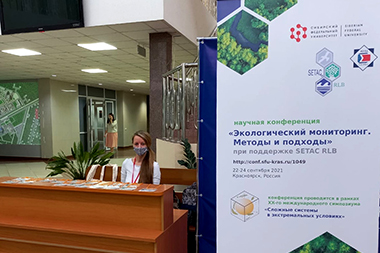
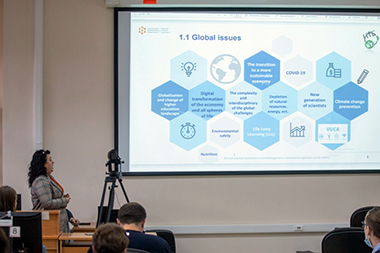
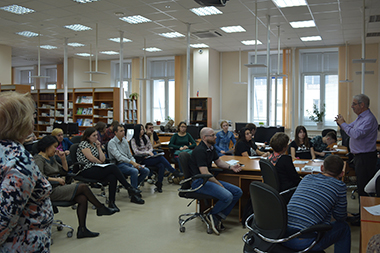

Biological Engineering: 2 years have passed
August 2020
Nargiza Hamzaeva and Santiago Palacious — have been living and studying here in Krasnoyarsk for the past 2 years. During this time they have experienced a lot: Russian winter, Winter Universiade 2019, summer internship in Baikal, world pandemic, online defense of their Master’s thesis and much more.
Santiago (from Equador) shares his experience about living in Siberia for 2 years:
“My experience in general at the Siberian Federal University after two years of study is very positive and I recommend it to anyone interested in doing a postgraduate degree course in this university, since it has elite teaching staff, laboratories and facilities that stand up to any American or European University; and I am very grateful to all the teachers, friends, and colleagues that I had the pleasure to meet here.
While studying at the Siberian federal University I learned a completely new scientific field for me - bioluminescence with professors and colleagues of an elite level in the academic field, and in the personal field, I discovered the soul, heart and kindness of the natives of the Siberian region. My conclusion here in Siberia is that I could observe the warm hospitability and enriched culture of Russia which only a few come to know.
The program met my expectations and I am very satisfied and happy as I learnt a lot and grew professionally. Moreover, I had unconditional support of my classmates and in my faculty in this specialty. Apart of my studies, I could visit amazing places like the Lake Baikal in the summer internship program.
The city of Krasnoyarsk impressed me from my first time here as I could visually experience a stunningly beautiful and imposing nature and withstood the glittering Siberian winters. Overall, in my opinion, it is a very nice city, friendly with foreigners and a very affordable place for students to realize their dreams.
My future plans are to continue with my PhD studies here as I am satisfied and happy with the university and the city. Further, I wish to continue the project I began in Spain for a joint work of the research Institute of biomedicine at the hospital San Pau of Barcelona in Spain and the Siberian Federal University, my doctoral research topic will be the investigation of the cancer tiraoides within the line of research of the professor Eugenia Mato Matute. I wish to thank the SibFU lecturers of our dear faculty for their the unconditional support in this project, in particular Professor Irina Egorovna Sukovataya and Professor Valentina Alexandrovna Kratasyuk.”
We don’t have a comment from Nargiza Hamzaeva as she is quite busy these days because she is going to publish two articles based on her work.
A comment from programme leader Valentina Kratasyuk:
„At the start we were very worried for these students, partly because they were the first international students at this programme and partly because Krasnoyarsk is located almost in the middle of Siberia and climate conditions here are quite different from their native countries. In addition, you can’t say for sure how an international student would react to these changes and to the different study system. Now we can say for sure that we are ready for any challenges that may arise with international students and we know that our research and education curriculum are at the high professional level. The success of the first graduates means the success of the entire staff of the Department.“
A comment from the head of International Educational Programes Irina Sukovataya:
„Now we offer several Master programmes that we fully taught in English. Moreover I would like to mention that students have a lot of possibilities for their personal and educational development within the chosen programme. For instance, they can participate in exchange programme and spend a semester in one of our partner universities in Europe.“
Defense of Master Thesis
July 2020
8th of July was a remarkable day — the Master programme "Biological Engineering" had come the end for our beloved international students: Nargiza Hamzaeva and Santiago Palacious — both of them have successfully defended their Master thesis.
We believe that it was an important day for both of them as it is quite stressful event on its own plus it was done online and it have added some worries as well. Nevertheless they managed to cope with the stress and technology and received their marks. During the online defense students presented the results of their work and proved that they have enough abilities and motivation for independent scientific work, also their received the feedback from the committee members. So it is the time when we say goodbye and wish them good luck in all of their endeavors.
Nargiza Hamzaeva defended her work on the topic of "Effect of dietary buckwheat (Fagopyrum esculentum) on SIRT1 protein expression in Bisphenol A administered rats" scientific supervisor: Dr. Shubhra Pande.
Santiago Palacious defended his work on the topic of "Determination of probiotic efficiency using ATP bioluminescence" scientific supervisor: Rajeev Ranjan
During their study they have also won Eranet+ scholarships and spent a semester in University of Lleida in Catalonia, Spain.
Semester Abroad
July 2020
Nargiza Hamzaeva and Santiago Palacious — have also won Eranet+ scholarships and spent a semester in University of Lleida in Catalonia, Spain; both of them are international students on the programme «Biological Engineering». So they have spent a semester in University of Lleida in Catalonia, Spain.
Here you can read what Santiago says about his experience in Spain:
«There we had to take several subjects offered by University of which I chose a profile of Biomedical Sciences and surgery as a recommendation of Professor Eugenia Mato Matute, professor of several universities and laboratories in the region of Catalonia, and I was invited to participate in his research line thyroid cancer in the Biomedical Research Center of the hospital San Pau de Barcelona».

Summer internship at the Baikal Lake
July 2019
Master students from the Biological Engineering program are sending greetings from Baikal lake. They have a unique opportunity to spend the part of their summer on the biggest fresh water lake in Russia — Baikal. Currently they are doing their internship there. The work is focused on using the living organisms as the indicators of anthropogenic pollution.
That's a win-win situation as you can see the famous lake in Russia and at the same time get to know a variety of tests used in the water toxicology.
During 2-week’s time students didn’t only learn about history and exceptional biodiversity of the Lake, but also they mastered the methods of biotesting. Biotesting is a process in which the researcher use the living organisms as test subjects and observe their behavior and survival rate under the influence of different pollutants.
In the course of their internship students got to know the typical habitats of the variety of invertebrates and they also learnt how to collect them for the research purposes. The collected animals were subjected to the different types of pollutants in various concentrations and their survival rate was assessed every 2 hours.
After all experiments students were asked to provide a written report of their findings together with all supporting data (graphs, tables etc.).
Without a doubt, they had a fun time by observing the real ringed seal in the natural habitat, hiking to the nearest mountains and of course by catching the test subjects.
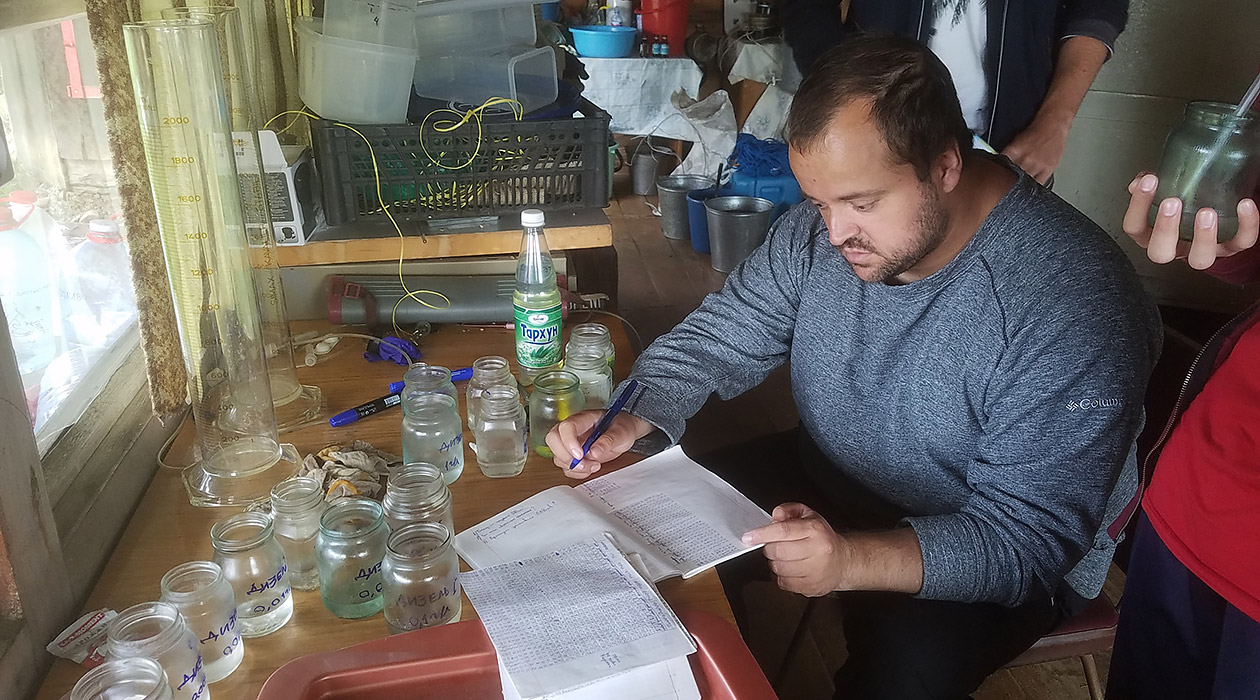
Teaching team of the Biological Engineering program presented current research at SETAC meeting
May 2019
The staff of the Department of Biophysics at Siberian Federal University with the Biological Engineering program leader Prof. Valentina KRATASYUK have participated in the SETAC Europe 29th Annual Meeting in Helsinki!
SETAC Helsinki was a 5-day event featuring a variety of training, networking and learning opportunities. The event was opened for everyone who is interested in emerging research, regulatory developments and the latest methodologies in environmental toxicology and chemistry. Between 2,000 and 2,500 scientists, assessors, regulators and managers from academia, business and government, representing an average of 60 countries, provided a unique networking opportunity and a chance for cross-collaboration long after the closing session.
During the meeting, the presenters from SibFU represents platform and poster presentations regarding the possibility of using different enzyme systems in the field of environmental bioassay of soil contamination.
Staff of program Biological Engineering participated activities during open school day at Siberian Federal University
April 2019
The open school day at Siberian federal University took part April 6, 2019, on the university campus. This activity is extremely popular among school students and future school leavers. During the open school day, the staff of the program demonstrated the participants possibilities of their experimental works, which could be a future topic of someone bachelor thesis. The big attention had a new topic of research connected with assessment efficiency of physical loads of athletes based on the bioluminescent assay of saliva. In addition, the participants had a chance to ask questions regarding entering the program and study process. Plus, the unique feature of this open school day was that the participants had a meeting with employers, who are interested in the program’s graduates. Thus, school students, who have had an intention to enter the program, are sure that we will have a job position after graduation.
More information?
Please contact our Department of International Educational Programs, SibFU
e-mail: study [at] sfu-kras [dot] ru
phone: +7 391 206-39-28
fax: +7 391 206-21-66
address: 82/6 Svobodny pr., room 427, Krasnoyarsk, 660041 Russia
 VKontakte: vk.com/international_education_sibfu
VKontakte: vk.com/international_education_sibfu
Ask a question
The University
Today Siberian Federal University (SibFU) with over 35,000 students enrolled in its programmes is one of the most actively developing universities in Russia. Annually more than 200 visiting professors — leading scientists from UK, Germany, Spain and USA — deliver their lectures at SibFU.
The University is a winner of the Russian Government grants supporting research projects under the guidance of top-level scholars from Russia and all over the world.
The campus of Siberian Federal University is located in a forested area of the city of Krasnoyarsk. Academic buildings and dormitories of the university are surrounded by natural forest lands and easily accessible by the public transport. More information about the University Campus can be found here.
The City of Krasnoyarsk
Krasnoyarsk is the administrative capital of Krasnoyarsky kray — second largest region of Russia. It is a big industrial and educational centre with a population of more than 1 million people, and also an important junction of the Trans-Siberian Railway.
The city is located on the banks of the Yenisey River in the valley formed by the Eastern Sayan Mountains. Nature reserve Stolby ("pillars") has become the city’s visiting card.
Among the famous people born in Krasnoyarsk are artist Vasily Surikov, opera singer Dmitri Hvorostovsky, biathlete Evgeny Ustyugov, skeletonist Alexander Tretyakov and ice-hockey player Alexander Semin.
In March 2019 Krasnoyarsk proudly hosted the

 Siberian Federal University
Siberian Federal University 





